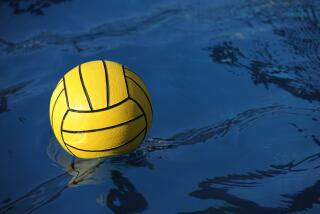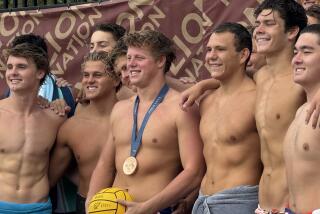He Prefers Being a Couch Potato--but He’s Back in the Olympics : Water polo: Doug Kimbell hates the water, and there’s no financial reward. Still, he’s driven to win a gold medal, which eluded the U.S. team four years ago.
LONG BEACH — Belmont Shore resident Doug Kimbell, a member of the U.S. Olympic water polo team, thrives on doughnuts, Cap’n Crunch and Red Hots.
Kimbell, 31, says he’s a couch potato who would rather work out in his health club’s Jacuzzi than swim laps. And the player voted Athlete of the Year in 1990 by U.S. Water Polo, the sport’s governing body, hates the water.
“Every morning when I wake up I think, ‘This is a stupid sport--I’m going to quit,’ ” Kimbell said. “As I’m driving down to the pool, I’m trying to think of excuses I can use to go home, like my car broke down.”
Kimbell has yet to conjure up a convincing excuse. Come Saturday, he and his fellow Olympians will play a grueling seven-game series against the world’s top water polo teams, including Spain, the hometown favorite; the former Soviet Union, now called the Commonwealth of Independent States, and Hungary, winner of the gold medal in 1976. Noticeably absent will be Yugoslavia, which took the gold from the Americans in a controversial decision eight years ago and struck gold again in 1988.
“We hoped the Yugoslavs would go this time, but there’s nothing we can do about it,” said Kimbell, a member of the 1988 squad. “If it was Yugoslavia, that was fine, but if we play Czechoslovakia instead, that’s OK too. We just want to play.”
For Kimbell, just wanting to play has kept him in the water for 18 of his 31 years, despite the sport’s limited appeal to fans and almost nonexistent compensation.
Unlike college football players, who often receive full tuition scholarships and hero status, Kimbell received $3,000 to cover part of his tuition and lodging when he was recruited for the UCLA water polo team in 1978.
He had already established himself at Villa Park High School in Orange, where his height (he’s 6 feet, 9 inches) and wingspan (seven feet from fingertip to fingertip) made him a standout.
“I didn’t even know how to do a flip turn when I signed up for the team,” he admits, “or side breathing. My coach worked with me a month before swim season and finally taught me how to swim with my head in the water.”
But the star high school swimmer floundered in the big Bruin pool, so Kimbell transferred to Santa Ana College--now Rancho Santiago College--and ultimately landed at Cal State Long Beach, where he made All American his senior year. He also began practicing with the U.S. National Water Polo Team two nights a week.
“Doug has all the things a coach looks for in a . . . defender,” said Ken Lindgren, Cal State Long Beach aquatics director and Kimbell’s former coach. “You want a guy with size and reach, and he has all of that. Plus, Doug has incredibly strong legs.”
Considering that water polo players spend about 70% of the time treading water, leg strength is critical. The game, which is divided into four quarters lasting seven minutes each, is a lot like basketball, played with a ball that resembles a volleyball and all done in at least seven feet of water.
It also challenges players mentally.
“You can’t show emotion. You look at a ref wrong and you can be thrown out of the game,” Kimbell said.
Which explains, Kimbell said, why he plays defense--to curb his aggressive streak. That streak now works to his advantage--he blocks with 230 pounds of force.
“He’s very competitive,” his wife, Kim, said. “Even at games like cards or backgammon, he has to win, no matter what.”
It was the 1988 loss to Yugoslavia that drove Kimbell to try out for the ’92 team. In fact, the U.S. team will have six returning players, among them goalie Craig Wilson, 35, and offensive player Terry Schroeder, 33. The three jokingly call themselves the “old men of water polo,” and Kimbell’s gray hair adds credence to the label.
He also has the requisite battle scars--his left knee holds five screws implanted during arthroscopic surgery in 1990 and his shoulder aches with tendinitis.
“I used to jump in the water and drill the ball as hard as I could,” Kimbell said. “Now I take my time to stretch first and loosen up. I guess I’m feeling it more.”
Along with physical sacrifices, he has made financial ones. “You really can’t work at a full-time job and train for the Olympics,” Kimbell said. “Some of the guys have their own businesses, but otherwise you have to be able to take off for weeks at a time.”
For Kimbell, “going for the gold” has meant living on his wife’s waitressing tips and about $9,000 in assistance from the U.S. Olympic Committee. It has meant traveling six to seven weeks a year, training nights and weekends during the off-season and five days since March. “Ever since I’ve been involved with water polo there’s been no money in this sport,” Kimbell said. “I started playing basketball when I began swimming, and since I picked up water polo easier I stuck with it. But when I see those contracts--average basketball players are getting a couple of million dollars a year--it’s ridiculous. At the basketball team’s last conference they had 16 sponsors.”
In contrast to the well-funded Dream Team, U.S. Water Polo has only one major sponsor--Alamo Rent-A-Car, which donated about $125,000 and free rental cars.
“To see the kind of money they’re giving the Dream Team, it’s discouraging,” said Bruce Wigo, executive director of U.S. Water Polo, based at the International Swimming Hall of Fame in Florida. “But to be honest, U.S. Water Polo didn’t do all that it could have after the ’84 games. We had great visibility then; we just didn’t pursue it. The sport is very marketable.”
Water polo players in European countries are national celebrities, and top players make about $300,000 a year, he said.
The lure of big lire and sellout crowds overseas appeals to American players more accustomed to scrimping than stardom. Kimbell was offered $70,000 to play on a Yugoslav club team before that country erupted in civil war. He’s still considering playing for Italy or Spain after the Olympics.
“We’ll see,” he said. “There’s a bumper sticker that pretty much sums it all up for me. It says, ‘Water polo . . . it’s a way of life.’ ”
More to Read
Go beyond the scoreboard
Get the latest on L.A.'s teams in the daily Sports Report newsletter.
You may occasionally receive promotional content from the Los Angeles Times.






